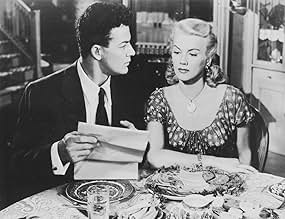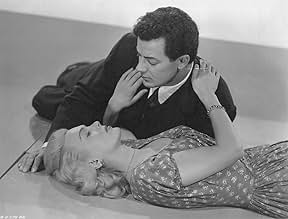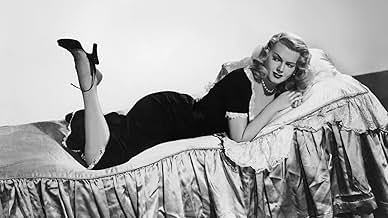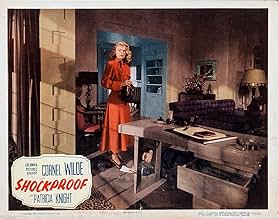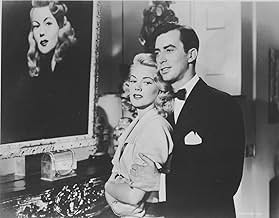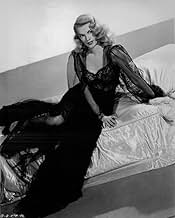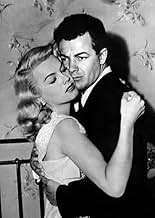VALUTAZIONE IMDb
6,5/10
2724
LA TUA VALUTAZIONE
Aggiungi una trama nella tua linguaA parole officer falls in love with his client, a ravishing blonde who served time for murder, and he's determined to help her go straight despite her interfering criminal boyfriend.A parole officer falls in love with his client, a ravishing blonde who served time for murder, and he's determined to help her go straight despite her interfering criminal boyfriend.A parole officer falls in love with his client, a ravishing blonde who served time for murder, and he's determined to help her go straight despite her interfering criminal boyfriend.
- Regia
- Sceneggiatura
- Star
Shirley Adams
- Emmy
- (non citato nei titoli originali)
Gilbert Barnett
- Barry
- (non citato nei titoli originali)
Richard Benedict
- 'Kid' - Knife Wielder
- (non citato nei titoli originali)
Paul Bradley
- Airline Clerk
- (non citato nei titoli originali)
Argentina Brunetti
- Stella
- (non citato nei titoli originali)
Paul Bryar
- Man in Car
- (non citato nei titoli originali)
John Butler
- Sam Green, Pawnbroker
- (non citato nei titoli originali)
Claire Carleton
- Florrie Kobiski
- (non citato nei titoli originali)
Cliff Clark
- Mac - Police Lieutenant
- (non citato nei titoli originali)
King Donovan
- Joe Wilson
- (non citato nei titoli originali)
Al Eben
- Joe Kobiski
- (non citato nei titoli originali)
Recensioni in evidenza
"Shockproof" is a 1949 Douglas Sirk film starring Cornel Wilde and Patricia Knight. Wilde is Griff Marat, who gets a paroled prisoner, Jenny Marsh (Knight) on his caseload. She refuses to give up the bad acquaintances that got her into trouble in the first place; this includes her old boyfriend, Harry (John Baragrey) whom she continues to meet secretly. Griff has taken Jenny into his home to care for his blind mother (Esther Minciotti), and over time, they fall in love. Though she's still pulled toward Harry, she balks when Harry wants her to convince Griff to marry her, a clear violation of his job ethics and her parole. Because Griff has political ambitions, they will then have them where they want him. Gradually Harry realizes that Jenny is not going to cooperate, and he ends up gravely injured. Griff and Jenny go on the run to avoid her arrest.
This is a pretty good noir with two heavyweights attached, Sirk, the director, and Sam Fuller, who co-wrote the script. Unfortunately, the characters aren't fleshed out enough so that we understand their sudden turnarounds - a man on the side of the law with political ambitions decides to throw it all out the window, marry a client secretly, and go on the run riding in boxcars and living in shacks because though the shooting was accidental, Griff feels Jenny won't be believed. That's just Griff - in reality, all three of the main characters do complete reversals during the course of this film with little or no justification.
Wilde does a good job here, and Knight, a new actress to me, is beautiful and has good chemistry opposite her then husband Wilde. She didn't work much longer, as after their divorce, her career dried up.
Entertaining.
This is a pretty good noir with two heavyweights attached, Sirk, the director, and Sam Fuller, who co-wrote the script. Unfortunately, the characters aren't fleshed out enough so that we understand their sudden turnarounds - a man on the side of the law with political ambitions decides to throw it all out the window, marry a client secretly, and go on the run riding in boxcars and living in shacks because though the shooting was accidental, Griff feels Jenny won't be believed. That's just Griff - in reality, all three of the main characters do complete reversals during the course of this film with little or no justification.
Wilde does a good job here, and Knight, a new actress to me, is beautiful and has good chemistry opposite her then husband Wilde. She didn't work much longer, as after their divorce, her career dried up.
Entertaining.
The title is ponderous - There are no "shocks" in this film or anything that would need you to be resistant to them. Just a catchy irrelevant title I guess.
Griff Marat ( Cornell Wilde) is a straight arrow of a parole officer with political ambitions. His latest charge is a woman, Jenny Marsh (Patricia Knight) who has just left prison after five years. Griff gets her a room and a job, but most importantly tells her she cannot see her old friends anymore, in particular, Harry Weeson, the man she killed for. But she is very beholden to Harry because he has waited these five years for her. Griff says that if he has waited that long he can wait awhile longer.
So you have young handsome single Griff, from an ethnic background that marries young, that can't afford any scandal if he wants to go up in the world. You have confused but beautiful Jenny who feels obliged to somebody she did time for. Shouldn't it be the other way around? And Weeson is hard to figure out. He's more of a professional gambler than a mobster, doesn't appear to be cheating on Jenny, and I never could figure out exactly what he wanted from her.
The killing Jenny did is never explained. If she was defending Weeson's life, why was it a crime? If it was her just killing somebody who was a nuisance to him, why is she out in only five years? Actress Patricia Knight is believable in this role, and although she is Wilde's wife at the time, she also looks much like Douglas Sirk favorite, Dorothy Malone, minus Malone's electricity. The reason I bring that up is Sirk directed this film.
The first 60% of the film really has no surprises. It took one of several paths I saw it taking from the start. But then the last third is really out in left field with Griff abandoning everything I thought that made him tick and with him showing himself to be much more wily than I thought him capable.
There is one really shocking scene when one parolee is told he is going back to prison. He begs to differ in a big way. It's definitely a Fuller touch - Sam Fuller wrote the script. But as for that ending, somebody must have locked Fuller in a broom closet and rewrote whatever ending he proposed. I'd recommend this one just because it is so very odd.
Griff Marat ( Cornell Wilde) is a straight arrow of a parole officer with political ambitions. His latest charge is a woman, Jenny Marsh (Patricia Knight) who has just left prison after five years. Griff gets her a room and a job, but most importantly tells her she cannot see her old friends anymore, in particular, Harry Weeson, the man she killed for. But she is very beholden to Harry because he has waited these five years for her. Griff says that if he has waited that long he can wait awhile longer.
So you have young handsome single Griff, from an ethnic background that marries young, that can't afford any scandal if he wants to go up in the world. You have confused but beautiful Jenny who feels obliged to somebody she did time for. Shouldn't it be the other way around? And Weeson is hard to figure out. He's more of a professional gambler than a mobster, doesn't appear to be cheating on Jenny, and I never could figure out exactly what he wanted from her.
The killing Jenny did is never explained. If she was defending Weeson's life, why was it a crime? If it was her just killing somebody who was a nuisance to him, why is she out in only five years? Actress Patricia Knight is believable in this role, and although she is Wilde's wife at the time, she also looks much like Douglas Sirk favorite, Dorothy Malone, minus Malone's electricity. The reason I bring that up is Sirk directed this film.
The first 60% of the film really has no surprises. It took one of several paths I saw it taking from the start. But then the last third is really out in left field with Griff abandoning everything I thought that made him tick and with him showing himself to be much more wily than I thought him capable.
There is one really shocking scene when one parolee is told he is going back to prison. He begs to differ in a big way. It's definitely a Fuller touch - Sam Fuller wrote the script. But as for that ending, somebody must have locked Fuller in a broom closet and rewrote whatever ending he proposed. I'd recommend this one just because it is so very odd.
Patricia Knight has just been paroled. Her parole officer is Cornell Wilde. He reads off the list of restrictions which she has already memorized. She almost immediately breaks them when she sees her former lover, gambler John Baragrey in a bookie shop, but Wilde gives her another chance. She loses her job, so her takes her into his home to take care of his blind mother. Soon they are in love. She goes to Baragrey's apartment to tell him goodbye. He calls Wilde at the office to tell him she's breaking parole and playing him for a sucker, so she shoots him. And she and Wilde go on the run.
Douglas Sirk directs with lots of fine location shooting, including the essential-for-noir Bradbury Building. He agreed to shoot this one after reading Samuel Fuller's original story, even though Columbia put in a cop-out ending that frustrated Wilde's character arc, from a straight-arrow fellow with political ambition to a criminal on the run. His real-life wife, Patricia Knight, gives a fine, guarded performance; you never know what she's really thinking or going to do next. Her movie career did not survive her divorce from Wilde. She died in 2004, age 89.
Douglas Sirk directs with lots of fine location shooting, including the essential-for-noir Bradbury Building. He agreed to shoot this one after reading Samuel Fuller's original story, even though Columbia put in a cop-out ending that frustrated Wilde's character arc, from a straight-arrow fellow with political ambition to a criminal on the run. His real-life wife, Patricia Knight, gives a fine, guarded performance; you never know what she's really thinking or going to do next. Her movie career did not survive her divorce from Wilde. She died in 2004, age 89.
Shockproof (1949)
Sam Fuller, the writer of this film, is admired for breaking rules and being a little bit edgy. Douglas Sirk, the director, is known for sumptuous, no compromise melodramas with gorgeous dreamy sets and an arch and affecting artificiality. They make an odd mix, and something doesn't quite click here.
The plot is standard fare but good--a parole officer falls for a reluctant parole, who still has a thing for a thug up to no good. The officer is terrific, Cornell Wilde at his regular guy best, a kind of echo of Dana Andrews with a little more warmth. But the main woman, Patricia Wright, is a bit wooden. You can feel her trying too hard too often, and it's just one of those things that cuts the rest of the effort down to size. Not surprisingly, she was only in five feature films, and was the lead in only one other.
But setting aside her presence and its deadening effect, there are some things to really enjoy here. You might find the movie ordinary for awhile, with some nice clichés and a steady development. But then, halfway, there's a huge and really sudden twist. And a believable one, a great scene. Suddenly there is a whole new plot. We aren't quite involved enough with the two leads to get swept away in their love affair (as we certainly do in "Gun Crazy" two years later, or in "They Live by Night" the same year), but it's exciting anyway. There are some scenes at an oil rig and the worker's cabins (I assume it's a set) that are gorgeous.
And then there's a sixty second surprise ending that doesn't do the movie justice and is very unlike Fuller. It's almost like someone took the script from Fuller and said, no Sam, that won't do. And rewrote it. And in fact that's what happened. One of the Columbia producers, Helen Deutsch, stepped in to remove Fuller's violent first intention. In fact, that final scene wasn't even directed by Sirk, who quit Columbia and left the country in anger (only to return and start a string of his famous 1950s masterpieces). A detailed account of all this is at www.tcm.com/this-month/article/208688%7C0/Shockproof.html.
What else? The photography by Charles Lawton Jr. is great (he had just done Welles's vigorous "Lady from Shanghai"), and a lot of the side actors are really good, especially the gambler boyfriend played by John Baragrey. This is one of those films to enjoy in pieces, or to enjoy for how it fits into the chronologies of some of the people who made it. Wilde and Knight, by the way, were still married during the filming (Wilde insisted Knight get the part) but they split up in 1951.
Sam Fuller, the writer of this film, is admired for breaking rules and being a little bit edgy. Douglas Sirk, the director, is known for sumptuous, no compromise melodramas with gorgeous dreamy sets and an arch and affecting artificiality. They make an odd mix, and something doesn't quite click here.
The plot is standard fare but good--a parole officer falls for a reluctant parole, who still has a thing for a thug up to no good. The officer is terrific, Cornell Wilde at his regular guy best, a kind of echo of Dana Andrews with a little more warmth. But the main woman, Patricia Wright, is a bit wooden. You can feel her trying too hard too often, and it's just one of those things that cuts the rest of the effort down to size. Not surprisingly, she was only in five feature films, and was the lead in only one other.
But setting aside her presence and its deadening effect, there are some things to really enjoy here. You might find the movie ordinary for awhile, with some nice clichés and a steady development. But then, halfway, there's a huge and really sudden twist. And a believable one, a great scene. Suddenly there is a whole new plot. We aren't quite involved enough with the two leads to get swept away in their love affair (as we certainly do in "Gun Crazy" two years later, or in "They Live by Night" the same year), but it's exciting anyway. There are some scenes at an oil rig and the worker's cabins (I assume it's a set) that are gorgeous.
And then there's a sixty second surprise ending that doesn't do the movie justice and is very unlike Fuller. It's almost like someone took the script from Fuller and said, no Sam, that won't do. And rewrote it. And in fact that's what happened. One of the Columbia producers, Helen Deutsch, stepped in to remove Fuller's violent first intention. In fact, that final scene wasn't even directed by Sirk, who quit Columbia and left the country in anger (only to return and start a string of his famous 1950s masterpieces). A detailed account of all this is at www.tcm.com/this-month/article/208688%7C0/Shockproof.html.
What else? The photography by Charles Lawton Jr. is great (he had just done Welles's vigorous "Lady from Shanghai"), and a lot of the side actors are really good, especially the gambler boyfriend played by John Baragrey. This is one of those films to enjoy in pieces, or to enjoy for how it fits into the chronologies of some of the people who made it. Wilde and Knight, by the way, were still married during the filming (Wilde insisted Knight get the part) but they split up in 1951.
A parole officer falls for one of his charges, but is she playing him for a sucker? Not so much a noir as a noir-esque romantic melodrama, and not up to the level of the best from either director Douglas Sirk or writer Sam Fuller. The story could have gone one of two ways, and it chose the less interesting path (from what I've read, this might have been a studio decision). However, Cornel Wilde and Patricia Knight (actual spouses at the time) handle their performances quite well, and play off each other with conviction and chemistry. The script has some nice touches, the photography is pretty sharp, and the supporting roles are good. It's certainly a watchable movie, just rather bland... and it wraps up far too easily.
Lo sapevi?
- QuizThis film features the iconic Bradbury Building at 304 S. Broadway as the location of Griff Marat's office. Out of his office window can be seen the old Hall of Records Building at 220 N. Broadway (demolished 1973), which is about 0.4 miles away.
- BlooperWhen Sam Brooks comes into Griff's office, he leaves the door open. After he reads the folder and leaves the door is closed without him ever closing it.
- Citazioni
Jenny Marsh: I'm no longer asking you to say goodbye. I'm just saying it!
- Curiosità sui creditiFollowing the opening credits the camera pans onto the curb edge of the road which reads HOLLYWOOD BLVD.
- ConnessioniFeatured in Behind the Mirror: A Profile of Douglas Sirk (1979)
I più visti
Accedi per valutare e creare un elenco di titoli salvati per ottenere consigli personalizzati
- How long is Shockproof?Powered by Alexa
Dettagli
- Tempo di esecuzione
- 1h 19min(79 min)
- Colore
- Proporzioni
- 1.37 : 1
Contribuisci a questa pagina
Suggerisci una modifica o aggiungi i contenuti mancanti

